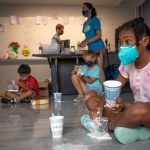“We want to empower the students to see the tremendous strengths they bring as member of the UConn community,” says Kenny Nienhusser, director of UConn’s La Comunidad Intelectual (LCI) learning community and a faculty member in the Higher Education and Student Affairs program. “They want a space on campus where they can reside on the same floor with people that understand them and provide them with the support they are looking for. It’s really a beautiful learning community that is a vibrant hub of happenings in the evenings and in the day when we have our seminar classes.”
The National Association for Gifted Children (NAGC) is pleased to announce the 2021 NAGC Distinguished Scholar. Each year, the association recognizes an individual who has made significant contributions to the field of gifted education and to the development of the organization for more than 10 years and a record of ongoing scholarly productivity. This year’s recipient is E. Jean Gubbins, Ph.D., Professor, University of Connecticut.
September is National Literacy Month and Deaf Awareness Month. To celebrate both occasions, we spoke with two IES-funded principal investigators about their intervention aimed at increasing the writing and language skills of students who are deaf or hard of hearing through teacher professional development targeting writing instruction and use of multilingual strategies. Together with their team, Dr. Kimberly Wolbers (University of Tennessee) and Dr. Hannah Dostal (University of Connecticut) developed Strategic and Interactive Writing Instruction (SIWI) and tested SIWI for efficacy. The team is now analyzing effects of SIWI on both student and teacher outcomes in the D/HH space.
When a doctoral program in education introduced a comprehensive funding package that covered tuition, it led to an increase in the number of applicants. The increase in the share of Black applicants and enrollees was particularly notable. That’s according to a new study published in AERA Open, a peer-reviewed, open-access journal of the American Educational Research Association. We did the study with co-authors Chris Bennett, Kenny Nienhusser and Milagros Castillo-Montoya.
On Sept. 25, UConn students gathered in the Student Union Ballroom, intent on hearing the ideas of their peers and staff members presented in a formal setting.
Saturday’s event was the first in-person TEDxUConn event since the onset of the COVID-19 pandemic. It featured talks from three speakers from the UConn community: one graduate student, one undergraduate and one staff member. The talks were connected by the theme of “the courage to persist.”
This summer, UConn neuroscientist Fumiko Hoeft, Neag School Associate Professor of Educational Psychology Devin Kearns, and collaborators from psychological sciences, education, mathematics, the Brain Imaging Research Center (BIRC), and others launched the five-week, all-expenses-included summer camp at Storrs for third- and fourth-grade children who are struggling to read.
Neag School of Education professor of science education Todd Campbell is working on two grants focused on expanding the diversity and accessibility of science education in Connecticut and beyond. The first grant is funded through a $1.5 million National Science Foundation grant. The project will develop and implement a unit on the science of COVID-19 through a social justice lens, while also supporting groups of teachers to develop, test, and refine justice-centered instructional practices in local schools.
The Connecticut Noyce Math Teacher Leaders (MTL) Program aims to support the development and retention of exceptional math educators in Connecticut’s highest-needs school districts — while also building these districts’ future leadership capacity in math education.
The Connecticut Noyce Math Teacher Leaders (MTL) Program, led by Principal Investigator and Neag School Associate Professor Megan Staples, aims to support the development and retention of exceptional math educators in Connecticut’s highest-needs school districts — while also building these districts’ future leadership capacity in math education.
The Connecticut Noyce Math Teacher Leaders (MTL) Program, led by Principal Investigator and Neag School Associate Professor Megan Staples, aims to support the development and retention of exceptional math educators in Connecticut’s highest-needs school districts — while also building these districts’ future leadership capacity in math education.



